
April 4, 2016 • No. 11 | PDF Previous Issues
Liberals’ Program for Real Change
– TML Weekly Editorial –
TML Weekly carried an editorial in its recent issue dated April 2 entitled, “The More Counterfeit the Measures, the Deeper the Crisis.”
The editorial addresses the program of reform the Trudeau Liberal government is implementing based on its electoral platform called Real Change. TML Weekly addresses the legitimacy crisis in which what are called the democratic institutions are mired, and puts the government’s program of reforms in this context. “The deepening opposition of workers, women, youth and Indigenous peoples to the nation-wrecking of the neo-liberal bourgeoisie… has peeled the facade from the democracy and revealed the police powers which remain in lieu of the government of laws,” TML Weekly explains. The editorial says the Liberals’ program for Real Change “is advanced to suggest that they have a plan to restore trust and create a different, progressive relationship between government and the citizenry. The fact that the Liberals are attempting to do so using ‘Third Way solutions’ and the same discredited concepts previous governments campaigned on of ‘openness, transparency, accountability’ and more, under which corruption, secrecy and police rule have grown exponentially, shows the dangers which lie ahead.”
The editorial continues:
“The concerns highlighted in the Liberal government’s Real Change program and mandate letters to ministers are to ‘restore Canadians’ trust and participation in our democratic processes’ as well as ‘make Parliament relevant again and to ensure that Canadians once again have a real voice in Ottawa.’ The Liberal government says it will ‘restore trust in our democracy, and that begins with trusting Canadians.’ They say ‘[p]eople know that Ottawa is broken. We have a comprehensive plan to fix it.’
“This past week in Ottawa, from March 31 to April 1, a $795 per ticket private conference called Open Dialogue Forum 2016 was held which reveals something about what this electoral promise for Real Change is about. Proponents say that Open Dialogue will heal what is wrong with policy-making. According to them, policy-making is not in trouble because it serves private monopoly interests and has enforced monopoly right over public right. It is not crisis-ridden because the ruling elites refuse to analyze the conditions and provide solutions which open society’s path to progress. In lieu of analyzing why the problems exist, the Liberals say that policy-making has been ‘deeply affected’ by ‘the speed of change, the interconnectedness of events, and a general volatility around public affairs.’ They claim that ‘[m]aking and implementing decisions in this environment requires new ways of gauging public support and establishing legitimacy.’
“To implement these ‘new ways,’ the 2016 budget includes $11.5 million over five years for the Treasury Board Secretariat ‘to double [its] budget for open government activities’ and $10.7 million over four years for consultations on reform to the electoral system. The meaning of the government’s dialogue and consultations can be seen in those it is already touting as examples of its ‘openness, accountability and transparency.’ These include consultations on the neo-liberal Comprehensive Economic and Trade Agreement between Canada and the European Union (CETA) after which Minister of International Trade Chrystia Freeland declared that she heard ‘no opposition’ to the deal. The ongoing ‘public’ consultations about another free trade deal, the Trans-Pacific Partnership, have been exposed as nothing more than private, invite-only meetings predominantly with representatives of private monopoly interests. Nonetheless these meetings are billed as ‘consulting Canadians on the Trans-Pacific Partnership’ and everyone else is invited to ‘participate’ in the ‘dialogue’ by e-mailing a government address set up for that purpose.
“Protests of working people have taken place in Canada and Europe against CETA. Despite this, the Minister of International Trade can declare that she heard ‘no opposition.’ She will no doubt declare ‘overwhelming support’ and ‘some concerns voiced’ about the Trans-Pacific Partnership as well and perhaps even tell us why the opposition does not merit attention. She can do so because the government and the private monopoly interests it represents have the political power to do so. But might does not make right. This process does not make the decisions legitimate.
“So too the government has rejected the process advocated by Indigenous communities themselves for the long-awaited Inquiry into Missing and Murdered Indigenous Women and Girls. They are the ones who know what is required to bring out the truth and achieve justice. The process the government has adopted in the name of listening to the concerns of the Indigenous peoples will bring nothing but disappointment and more police rule to quell the peoples’ revolt.
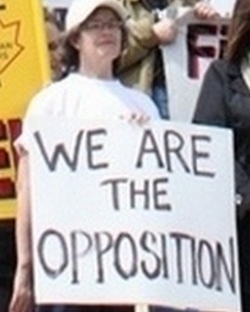 “This supercilious effort to restore an appearance of legitimacy is becoming a main feature of the Trudeau Liberal government. The Liberals captured the most seats in the federal election, but despite this the vote showed a divided polity. Knowing that elections no longer confer legitimacy, Trudeau clearly feels the need to provide his program for Real Change with legitimacy by repeating over and again that the Liberals’ program comes from Canadians themselves. The Trudeau government is going all out to mobilize its social base within the trade unions, non-government organizations and within the intellectual strata to endorse and peddle its program to attempt to make it stick. The mantra is that if the Liberal reforms and consultation are ‘done right,’ everything will be fine. The role of Canadians is to ‘hold the Liberals’ feet to the fire’ and make sure they are true to their stated aims. What these stated aims are is not to be questioned. The bafflegab about openness, transparency, accountability and schemes to reform the electoral process aims to deprive the people’s movement for empowerment of its consciousness and organization by trying to force it to respond to the government’s agenda for reforms with a ‘wait-and-see’ attitude instead of elaborating its own program for renewal of the democracy.
“This supercilious effort to restore an appearance of legitimacy is becoming a main feature of the Trudeau Liberal government. The Liberals captured the most seats in the federal election, but despite this the vote showed a divided polity. Knowing that elections no longer confer legitimacy, Trudeau clearly feels the need to provide his program for Real Change with legitimacy by repeating over and again that the Liberals’ program comes from Canadians themselves. The Trudeau government is going all out to mobilize its social base within the trade unions, non-government organizations and within the intellectual strata to endorse and peddle its program to attempt to make it stick. The mantra is that if the Liberal reforms and consultation are ‘done right,’ everything will be fine. The role of Canadians is to ‘hold the Liberals’ feet to the fire’ and make sure they are true to their stated aims. What these stated aims are is not to be questioned. The bafflegab about openness, transparency, accountability and schemes to reform the electoral process aims to deprive the people’s movement for empowerment of its consciousness and organization by trying to force it to respond to the government’s agenda for reforms with a ‘wait-and-see’ attitude instead of elaborating its own program for renewal of the democracy.
Join the CPC(M-L) Mailing List
“The Liberals however have to contend with the fact that nowadays not many people hold illusions about them and their programs. From one end of Canada to the other the people are working out how to provide the problems they and society face with solutions. Liberal illusions will be smashed by the people working out independent stands which contribute to resolving the crisis of nation-building in their favour.
“What is clear is that the Third Way measures the government is trying to exhume and resuscitate will further lift the veil on its program to pay the rich and enforce monopoly right over public right. The new form of government is a new form of police rule and it will provide no legitimacy whatsoever.”
To read related articles and reference material, see the April 2 issue of TML Weekly here.
Our Security Lies in Our Fight for the Rights of All!
Torontonians Demand Justice for Police Killing and an End to Escalating Police Violence and Impunity

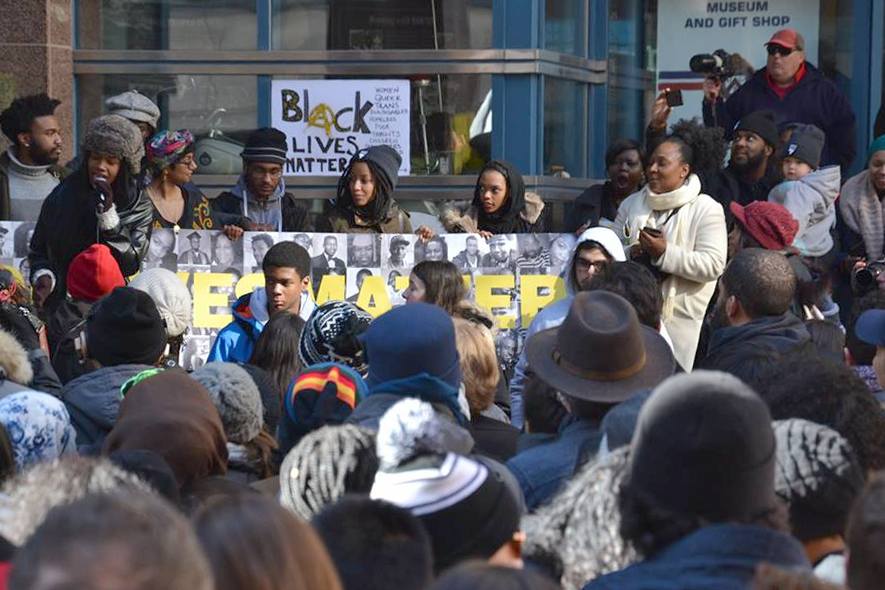
Hundreds of Torontonians, mostly youth, participated in a mass rally at Toronto Police headquarters on the afternoon of March 26 to demand justice in the police killing of Andrew Loku, a 45 year-old Sudanese immigrant who was shot to death in July 2015. The protest was organized by the Black Lives Matter Toronto and included workers, students, political activists and representatives of many national minority groups. They chanted and displayed placards that read: “Stop Racist Police Violence,” “Stop Shooting My Brothers,” “No justice, no peace!” and “Black Lives Matter!” The protest continued into the evening as more people joined the action. In response, the police shut down the street.
The March 26 protest followed a week where Black Lives Matter activists and their allies held a round-the-clock vigil and tent city outside Toronto Police headquarters. They were in responding to the announcement by the Special Investigations Unit (SIU) on March 18, that no charges will be laid against the police officer who fatally shot Mr. Loku because the officer had not exceeded “the ambit of justifiable force in the circumstances.” The police also tried to dismantle the tent city on the first night of the vigil under the pretext of “public safety.” However, they failed because of the resolve of the youth who would not back down. Protests continued non-stop outside police headquarters until April 4 when a rally was held at Queen’s Park during which Premier Kathleen Wynne approached protestors to say that she wanted to meet with them. Activists announced there that they will resume their protests if the Toronto municipal government and Ontario government do not adequately address their demands within 300 hours or by Saturday, April 16.
The SIU is a body composed of mostly former police officers and other point men of the state. Created by the Ontario government in 1990 it was tasked with investigating the deaths, serious injuries and allegations of sexual misconduct caused by police in carrying out their duties. It was the response of the state to the people’s opposition to police violence and killings in Toronto during the 1980s. Black men and youth were being targeted such as Lester Donaldson and Wade Lawson who were were gunned down by police despite being unarmed or because they were acting erratically as a result of suffering mental illness. Following the shootings, the police covered their tracks and were given protection by the institutions of the state and monopoly-owned media.
But the creation of the SIU did not change anything substantial except as regards perfecting the cover-up.
 The protesters on Saturday were not only demanding justice for the killing of Loku and other black and national minority men which they consider to be racially-motivated, but also to express their dissatisfaction with the SIU because of its long history of protecting the police and encouraging police violence and their ability to act with impunity.
The protesters on Saturday were not only demanding justice for the killing of Loku and other black and national minority men which they consider to be racially-motivated, but also to express their dissatisfaction with the SIU because of its long history of protecting the police and encouraging police violence and their ability to act with impunity.
Expressing their rejection of the SIU’s conclusion of the Loku killing, the protesters called for the SIU to release the name of the officer who killed Loku, the release of the police video that captured the fatal encounter, compensation for Loku’s family, a coroner’s inquest into the victim’s death and that the SIU lay charges against the police officer. They also demanded that the SIU be comprised of community members and not just police officers.
In response to this action led by Black Lives Matter, three Toronto city counsellors have come forward to broker “talks” between the protesters and the police. Toronto City Council has subsequently passed a resolution calling on the Provincial government to look into the serious issue of police violence against the people.
In fact, City Council has little control over the police in Toronto. More often than not it has condoned police brutality and violence. For instance, during June 2010 protests in Toronto at the G20 Summit when over 30,000 protesters were teargassed, beaten and over 1,200 were arrested, Toronto City Council took the lead in congratulating the police forces for doing what it considered to be a good job keeping law and order.
A spokesperson for Black Lives Matter Toronto expressed the determination of the youth to put an end to police violence and brutality. The main targets of this violence are black youth who stand up for their rights and speak out against the state attacks. The youth deserve the support of all Canadians. Torontonians have been bringing food and other supplies and spending time and standing with Black Lives Matter Toronto at the tent city.
Oppose State-Organized Police Violence and Racism!
Our Security Lies in the Fight for the Rights of All!
(Photos: CUPE)
Information on Ontario’s Special Investigations Unit
The Ontario Special Investigations Unit (SIU) is mandated by law to investigate “death, serious injury of allegations of sexual assault” caused by police in the carrying out of their duties. On March 18, it ruled that the police shooting death of Andrew Loku, a 45-year-old South Sudanese refugee, was justified. Loku had suffered bouts of mental illness, a fact that was known to the police. At the time of his death, he was working to get this family to join him in Canada. The police alleged that Loku had been shot because he was threatening them with a hammer, a story that was contradicted by eyewitnesses.
The SIU was established as part of the Ontario Police Services Act in 1990 in response to the public outcry, demonstrations and protests that broke out in Toronto that demanded justice and redress in the face of police shooting down unarmed black and other minority youth, in particular the case of Wade Lawson, a black teenager shot and killed by police in 1988. According to the SIU website: “The SIU is the first of its kind in Canada and Ontario remains one of the few places worldwide that has an independent civilian agency with the power to both investigate and charge police officers with a criminal offence. Since its inception in 1990, the SIU has taken great strides and as such has become a model of civilian oversight for other jurisdictions amid an international movement toward greater civilian accountability of police.” The SIU is described as an “arms-length civilian body.”
To say the SIU is made up of civilians is misleading given the number of former police officers which comprise its membership, along with former crown attorneys and various other representatives of state institutions. A study done in 2010 by the Toronto Star noted that out of 54 full and part-time investigators working for the SIU, 47 were former police officers. This makes it certain that the police will get preferential treatment from the SIU and that the state’s use of police forces against the people will continue unchecked. In almost 26 years since its founding, the SIU, alleged to be a “civilian arms-length” body, has failed to meet the people’s expectation that police who carry out shooting deaths and brutalize people should be brought to justice.
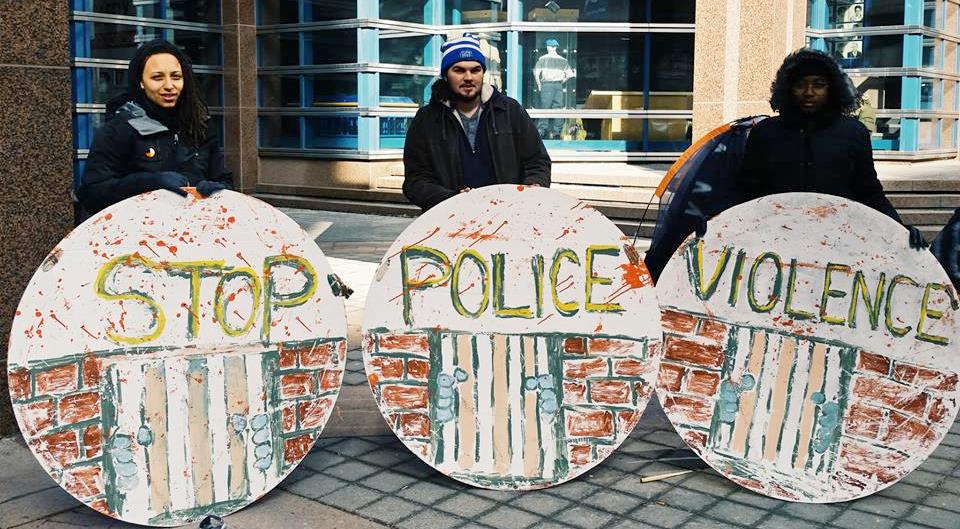 The study also found out that in the 20 years since its founding, the SIU had conducted at least 3,400 investigations and laid criminal charges against police in only 95 of them. Of that number, only 16 police officers were convicted and only three were jailed. Ninety-seven per cent of the cases investigated do not result in charges laid.
The study also found out that in the 20 years since its founding, the SIU had conducted at least 3,400 investigations and laid criminal charges against police in only 95 of them. Of that number, only 16 police officers were convicted and only three were jailed. Ninety-seven per cent of the cases investigated do not result in charges laid.
An article by written former Ontario Ombudsman Andre Marin in 2012, based on investigations he conducted that were triggered by public complaints about the SIU, noted: “The public is justifiably suspicious of any oversight process that involves police investigating police. When police officials regardless of what force they serve on investigate their own, they are not only vulnerable to conscious and unconscious influences arising from their shared police experience, but also to the reasonable perception that their assessment of their brothers and sisters in arms may be improperly tainted.”[1]
Marin outlined examples of police refusing to cooperate with SIU investigators. He noted that since 1999 Chiefs of Police have been required under the Police Services Act to notify the SIU immediately of any serious injuries or deaths involving police, but this is routinely ignored. He noted that often the police justify their “heel-dragging” by blaming “confusion” about police protocols and other excuses.
The former Ombudsman also found that while the Police Services Act requires that “subject officers” — those under investigation — be segregated immediately after an incident, in the overwhelming number of cases this was not enforced. These officers were permitted time to contact their lawyers and also talk to “witness officers” — those who witnessed the incident taking place — in order to corroborate their stories and write their notes.
Marin also found that former police officers working as SIU investigators have been known to “use disparaging remarks…to describe civilian victims and witnesses, “and to use “overly friendly leading questions when interviewing police witnesses.”
On the basis of his investigation, Marin recommended that the Ontario government reconstitute the SIU under new legislation and expand its mandate and legislative authority which would include such features “as an expanded definition of serious injuries coming within the SIU mandate, clear direction on the scope of police disclosure obligations, an effective method of enforcing police compliance” and other provisions. Since the recommendations were made there have been no amendments to the Police Services Act dealing with the SIU.
In response to ongoing protests and a Toronto City Council motion calling for a review of SIU investigations, a spokesperson for the Ontario Attorney General told media on April 1 that the Ministry of Community Safety and Correctional Services will undertake a consultation on police oversight and review the roles of the SIU and the Office of the Independent Police Review Director, and the Ontario Civilian Police Commission. “The results of these consultations will support work being done by government to shape the Strategy for a Safer Ontario, which may include updates to the Police Services Act,” the spokesperson said.
Note
1. “The Ontario Special Investigations Unit: Securing Independence and Impartiality” in Police-Involved Deaths: The Need for Reform, published by the BC Civil Liberties Association, 2012.
(Photo: A. Williams-King)
In the News
More on Canada’s Participation in U.S.-Led War Coalition
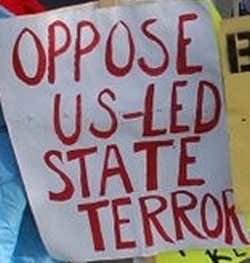 On April 1 in Washington, DC following his participation in a U.S. Nuclear Summit, Prime Minister Trudeau announced that Canada will be “investing” in the “Global Coalition Against the Islamic State of Iraq and the Levant (ISIL).” The “Coalition,” which includes Canada is thus far an informal group of countries carrying out military actions in Iraq, Syria and elsewhere under the leadership of the U.S.[1]
On April 1 in Washington, DC following his participation in a U.S. Nuclear Summit, Prime Minister Trudeau announced that Canada will be “investing” in the “Global Coalition Against the Islamic State of Iraq and the Levant (ISIL).” The “Coalition,” which includes Canada is thus far an informal group of countries carrying out military actions in Iraq, Syria and elsewhere under the leadership of the U.S.[1]
The U.S. imperialists have established this new “coalition”to carry out military aggression in the Middle East once again, just as they did when they spearheaded the creation of a “Coalition of the Willing” to launch the 2003 invasion of Iraq under the fraudulent pretext of stopping weapons of mass destruction.
Trudeau announced that Canada will “invest” $51 million over three years to “build the capacity of counter-terrorism programs in the Middle East and North Africa.” The money comes out of funds announced by the Prime Minister on February 8, 2016 when Canada articulated its expanded war mission in the Middle East with an emphasis on Iraq, Syria, Jordan and Lebanon. A government news release says the funds will focus on “programming to stem the flow of foreign terrorist fighters, and countering ISIL’s financing and messaging.” What this means precisely is probably more aptly understood by Canada’s special forces and intelligence agencies than the Canadian public. The funds will also be used to “support border security activities in neighbouring countries in order to reduce their vulnerability to ISIL infiltration,” a news release from the Prime Minister’s Office says.
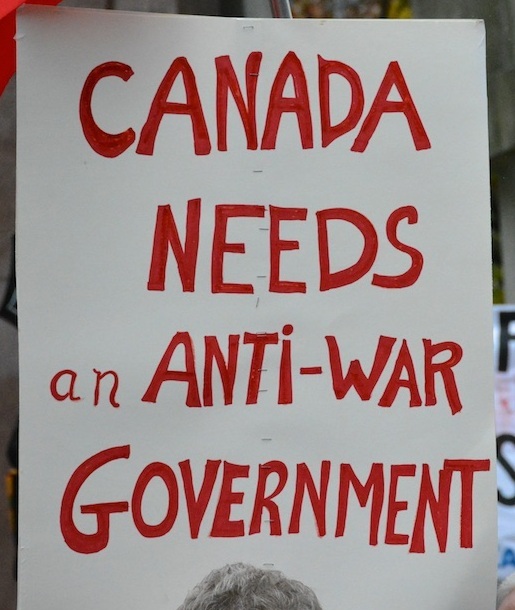 During a visit to Australia and New Zealand by Defence Minister Harjit Sajjan it was further revealed that the Canadian Armed Forces (CAF) are contributing military staff to an Australian-led Combined Task Force 150 (CTF-150) under the umbrella of the U.S.-led coalition. Canada is providing the Deputy Commander and Chief of Staff.
During a visit to Australia and New Zealand by Defence Minister Harjit Sajjan it was further revealed that the Canadian Armed Forces (CAF) are contributing military staff to an Australian-led Combined Task Force 150 (CTF-150) under the umbrella of the U.S.-led coalition. Canada is providing the Deputy Commander and Chief of Staff.
This “Global Coalition” seems to be a standing institution to which Canada is providing funding for various programs conducted under U.S. military command. At the same time, Canada claims it wants to re-establish its commitment to the United Nations and world peace and it is seeking a seat on the United Nations Security Council on this basis.
The Liberals’ campaign promises to renew Canada’s reputation in the world by re-establishing its role as a peacekeeper has little to do with defending the peace.
For more on the “Global Coalition to Counter the Islamic State of Iraq and the Levant (ISIL)” see TML Weekly, February 6, 2016 – No. 6.

